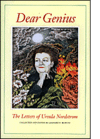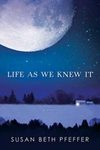 I’ve been meaning to do a DROP EVERYTHING AND READ THIS post about Ursula Nordstrom’s letters ever since I got back from Vermont in January. During our short course, Jane Kurtz had a student read a few selections from Leonard S. Marcus‘s Dear Genius: The Letters of Ursula Nordstrom
I’ve been meaning to do a DROP EVERYTHING AND READ THIS post about Ursula Nordstrom’s letters ever since I got back from Vermont in January. During our short course, Jane Kurtz had a student read a few selections from Leonard S. Marcus‘s Dear Genius: The Letters of Ursula Nordstrom , and I was so hooked I went immediately back to my room and ordered it from Amazon, so it’d be there waiting for me when I got home. Ever since, I’ve been dipping into it heavily when the dreariness of late winter gets to be too much.
, and I was so hooked I went immediately back to my room and ordered it from Amazon, so it’d be there waiting for me when I got home. Ever since, I’ve been dipping into it heavily when the dreariness of late winter gets to be too much.
Nordstrom ran Harper’s Department of Books for Boys and Girls from 1940 to 1973. She is, to put it mildly, a legend, and I still can’t believe I’d never heard of her. She worked with E.B. White on Charlotte’s Web and Stuart Little (did you know his wife was fiction editor at the New Yorker during the time he was writing those?), Maurice Sendak on Where the Wild Things Are, Margaret Wise Brown on Goodnight Moon, and pretty much everybody else you’ve heard of (and some you probably haven’t) who worked on children’s books during that time period. She turned down Andy Warhol for an assignment because the illustrations he submitted as samples were "overly decorative."
Her directness is hilarious and refreshing, her charm the best, wittiest kind (with a dose of self-deprecation where needed), and her letters often run at the same breakneck pace she did. And it’s amazing, actually, how much of an editor she was — how demanding, and how often her hand really did shape something and make it better. So, it’s worth reading her letters for insights into the editorial process. But, don’t kid yourself, they’re even more worth reading for FUN.
Part of the problem of posting a letter so you can get a feel for her voice is that They Are All Wonderful. So I’m just going to choose one or two at random.
And, what luck that this one came up, what with the whole scrotum kerfluffle:
May 1, 1967
Dear ———-, (this was a graduate student doing research)
Thank you for your recent letter about "controversial literature" for children, with particular emphasis on Harriet the Spy and The Long Secret by Louise Fitzhugh.
You ask about our future plans for publishing controversial books; we have no taboos, within the limits of good taste. We think that any subject of interest to young readers can be treated, by a creative writer, in books for young readers. It is difficult to find the writers; but if we can find writers who will write the manuscripts, we are sure the children will welcome more vigorous books. And we think there are enough perceptive and sensitive librarians, teachers and parents to help us get them to the children.
As for your comments concerning these books, I remember clearly the day I read the manuscript of The Long Secret and came upon the part devoted to Beth Ellen’s first menstruation. I wrote in the margin, "Thank you, Louise Fitzhugh!", for it seemed to me it was about time that this subject, of such paramount importance to little girls of Beth Ellen’s age, was mentioned naturally and accepted in a children’s book as a part of life.
I am sorry to say that we cannot give you Miss Fitzhugh’s home address, but if you would like to write to her care of this office, we will forward your letter to her. Since we do not handle dirct orders for our books, I cannot send you a copy of The Long Secret c.o.d. However, if your bookstore is unwilling to order a copy for you, we will be glad to do so upon receipt of your check for $3.95.
Yours sincerely,
Okay, how about one where she’s writing to an artist/author?
January 28, 1960
Dear Garth (Williams),
I will write you a good letter soon.
But not today.
Today all I can say to you is why did you decide to put three sleeves on Frances’ bathrobe on Page 15 and again on Page 18 of Bedtime for Frances……. ????? I didn’t notice the three sleeves. Neither did Russ. Or the salesmen to whom I showed the pictures at the Sales Conference. Or Susan Carr. Or Dorothy Hagen in the Manufacturing Department. But the young lady, Joan Lexau, who goes over proofs and such in our department just noticed the third sleeve. And she wrote me a note which said "Please note third sleeve. OK?" Should I kill myself? Or what?
Garth, badgers only have two arms in their bathrobes.
We realize that you are a very famous artist and if for the same price you will draw three sleeves instead of just two sleeves I guess we should be grateful. But three sleeves is one too many. It looks like something by Charles Addams. I sure as hell wouldn’t go to bed and to sleep in a room with a bathrobe with three sleeves….. And I’m a very OLD badger.
Well, I just went up to show the pictures to Dorothy Hagen and she thinks she can fill in the little white spot with benday so the third sleeve (which, seriously, is the bottom of the robe we all think) won’t look quite so obvious.
You are a dear fellow, Garth. Black and white integration*, or badgers with three sleeves. What minority group will you exploit next?????
Too bad about Diana Barrymore, wasn’t it. Strange to think of all the time and thought Margaret W(ise) B(rown) and Michael gave that complication. And now they are all dead. Well, makes one decide not to worry too much about too many sleeves in too many bathrobes, doesn’t it…….
Keep working on Bad Morning. Also a Tall Book by you will make me very very happy and you very very rich. Also finish your Moon Book. Work hard. Stand up straight. Don’t smoke. Take deep breaths.
Love to all,
*The footnote explaining this reference says: "GW’s picture book The Rabbits’ Wedding, 1958, had caused an uproar with its depiction of a marriage between a white rabbit and a black one."
And there are much, much better ones.
I should add, too, that I just finished reading Marcus’s The Wand in the Word: Conversations with Writers of Fantasy , which I also highly, highly recommend. (And it was on the Locus recommended reading list, too.)
, which I also highly, highly recommend. (And it was on the Locus recommended reading list, too.)
See also:
Salon on Dear Genius just before it came out in 1998
The NYT on same

